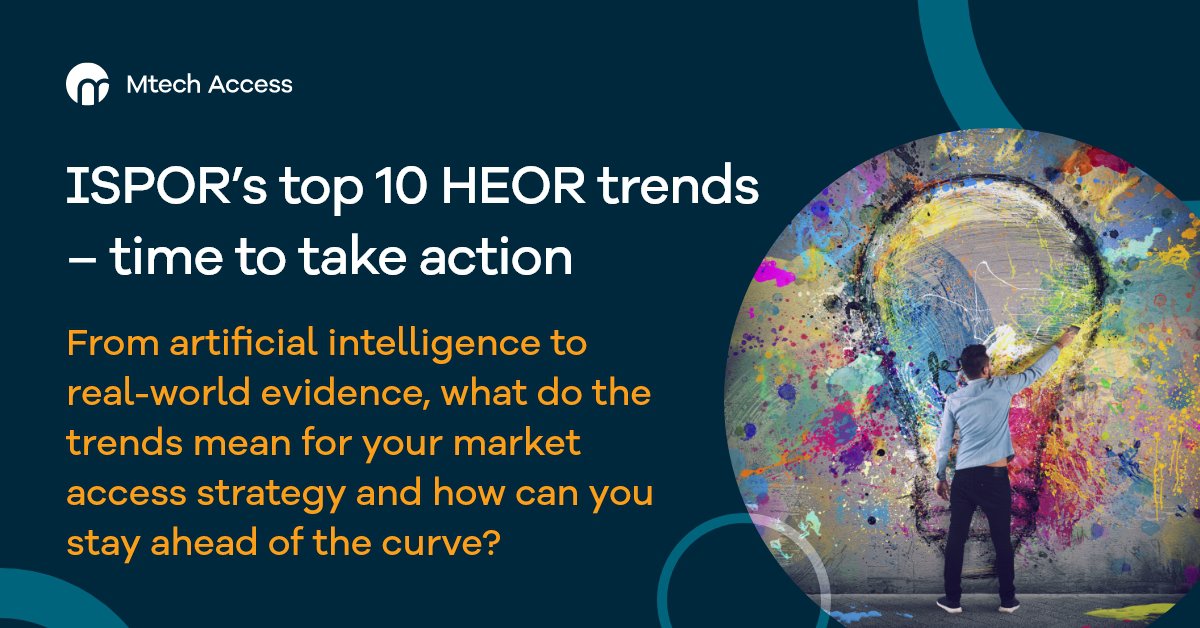
The publication of ISPOR’s ‘2024-2025 Top 10 HEOR Trends Report’ coincides with strategic planning and product launch plans for many organisations. The report provides excellent insight into the core themes that, when considered within the context of the specific organisation, help to identify the opportunities and threats that could impact business plans. Such key strategic issues help focus decision making and the prioritisation of resources.
We recommend that our readers across the life sciences and healthcare sectors bear in mind the following questions when considering each of the identified trends:
- What can I do now in light of these insights?
- What impact might they have on my HEOR and market access strategies?
- How can I stay ahead of the curve?
- What support do I need from agency partners?
In this article, Prof. Phil Richardson (Chief Innovation Officer & Chair) prompts some discussion points for Pharma and Medtech to explore internally. He also indicates where expert consultancy support could add value, and what to look for for in an agency partner.
Jump to:
- Real-world evidence
- Drug pricing
- Artificial intelligence
- Fostering innovation
- Health equity
- Accelerated drug approvals
- Value measurement
- Patient centricity
- Precision medicine
- Public health
Real-world evidence is a team sport
As real-world evidence (RWE) begins to have a more significant role in healthcare, specialists and HEOR generalists need to work together. You need access to an HEOR strategist who can help plan and organise relevant RWE. It’s also important to work with someone who understands trial design and can help put an evidence strategy together.
Drug pricing – a science or an art?
Drug pricing and working through reimbursement strategy for Pharma interventions needs a team that can bring together the art of decision making with the science of data. A close relationship with the regulators is as important here as, for instance, the ability to model QALYs. You need to be talking to someone who not only knows the HEOR space, but has taught it. In turn, this HEOR expert will need a colleague who has senior experience in the local health environment (e.g. as a payer or commissioner).
Are you ready for AI in product launches?
AI in product commercialisation is a tricky topic. There is a great deal of excitement surrounding the art of the possible, some around the art of the probable, and little in the way of what is currently practical. Faced with navigating the rhetoric and technical uncertainty, you need to think about those who have provided high-quality digital products and services to date.
Not only are they likely to be connected to the right technological solutions, but are also more likely to be in the right frame of mind to automate and build in machine learning and AI. Therefore, you need access to innovators with a digital background in HEOR delivery.
Innovation surrounds us in healthcare
We are surrounded by innovation, from continual improvement to market disruption. Innovation can work well in HEOR, but you need the right innovation partner to know when risk aversion, appearing as decision avoidance, is actually a high-risk move.
Start asking key questions of your Innovation partner, such as what proportion of revenue is committed to innovation? Is there a dedicated team? Does the Innovation Lead sit on the board? Is there a track record of innovation adoption? Are they connected to health systems as well as industry networks? Can you have direct access to the Innovation Lead and understand their product and service roadmap?
Addressing the challenge of health equity
Health equity has always been a goal. However, focus on products and pathways is not a route to addressing health equity challenges. Instead, we should focus on neighbourhoods, communities, and populations. Placing the person at the centre of decision making has finally come of age.
Agencies cannot do this on their own. They need to be closely connected to health systems, primary care, and secure health data environments. Having a greater understanding of related data, such as deprivation, is also key. If you’re working with a UK agency, ask the question – how many people from the NHS, public health, and local authorities are you directly working with?
Accelerated approvals – a win-win for all
Accelerating drug approvals and the adoption of Medtech innovations for patient benefit is the drum beat of every organisation in our industry. Speed to market and sustainable competitive advantage are the main tenets of market access strategies. Yet for some small (and larger) enterprises, it can take 7+ years for an initial tested design to reach patient hands.
As a piece in this puzzle, health technology assessment (HTA) timelines must be challenged. You need to question why decision making cannot be quicker, asking – who is focused on your access speed and the technical content of your submission?
Are you viewing value from every angle?
When considering value, you need to explore all contributing factors. Are you experiencing enough of a challenge when you mention value? Are you seeing your team exhibit divergent thinking to explore all the factors that could contribute to better patient outcomes and a better healthcare experience?
Is the patient at the centre of your thinking?
One way to drive patient centricity is to surround yourself with colleagues and consultancy partners who have this focus, who ask why the patient is not at the centre. Are you focusing on the patient, as well as the spreadsheet? Does your team have a designated Chief Patient Officer? How many patients are engaged under a patient leadership programme?
Shape the landscape for precision medicine
Precision medicine will be at its peak when we precisely understand the patient. Chasing the solution without the bedrock of personalised information is a ‘rush to standstill’ strategy. In many health systems, general practice is not connected to the nearby tertiary treatment centre. This creates a lack of cohesion, which can lead to, for example, blood tests being repeated in both settings.
It’s time to shift part of the process and digital muscle to the Market Access and Sales teams in the field, to build partnerships and help navigate the journey. You need to ask – who is already doing this? Can I volunteer my organisation to help shape the landscape, rather than just mapping it?
Public health or population health
We need to stop talking about public health and start championing population health management and the granularity of community and neighbourhood.
Strategic planning must embrace the wider determinants of care, understanding socioeconomic impact, psychosocial analysis, macroeconomics, and all the factors that determine good health outcomes for people. There is excellent information available on the wider determinants of health. The ability to understand related information and the impact on outcomes is essential. Specialised help is available in a limited number of HEOR agencies, but it is worth asking – who can help?
Turning trends into actions that deliver results
The above discussion should give you a handy checklist for the next meeting your team has with your consultancy.
Who is propelling your success and who is completing the tasks? What matters most to you in the context of the opportunities and threats that emerge within these trends? How can you best leverage the combined efforts of your in-house team and your strategic HEOR and Market Access partner?
We believe that the trends put forward by ISPOR can be more than points of interest. With this insight, leadership teams can develop responses that mitigate or take advantage of the opportunities or threats, to drive better performance and improve patient outcomes.
Finding the headroom to do this is a challenge. HEOR leaders are facing the overlapping pressures of budgeting, sales performance, workforce turnover, competing priorities, and the changing dynamic of healthcare delivery, funding, and regulation. Value and Market Access field teams are battling the need for operational performance with that of transformation for the future. Something has to give.
Receiving timely support has become ever more critical in this dynamically changing environment. Being able to quickly engage with a trusted adviser who has access to an expert team across the whole HEOR pathway is an essential component of any strategy. The creation of an adjunct team, knowledgeable about your business and capable of adapting and responding to your needs, is the innovative way to adapt and respond to change.
We believe we can be the perfect partners for these discussions. If you’d like the opportunity to explore this with our Innovation Team and our HEOR, Market Access, and Value experts, drop us an email at info@mtechaccess.co.uk.


